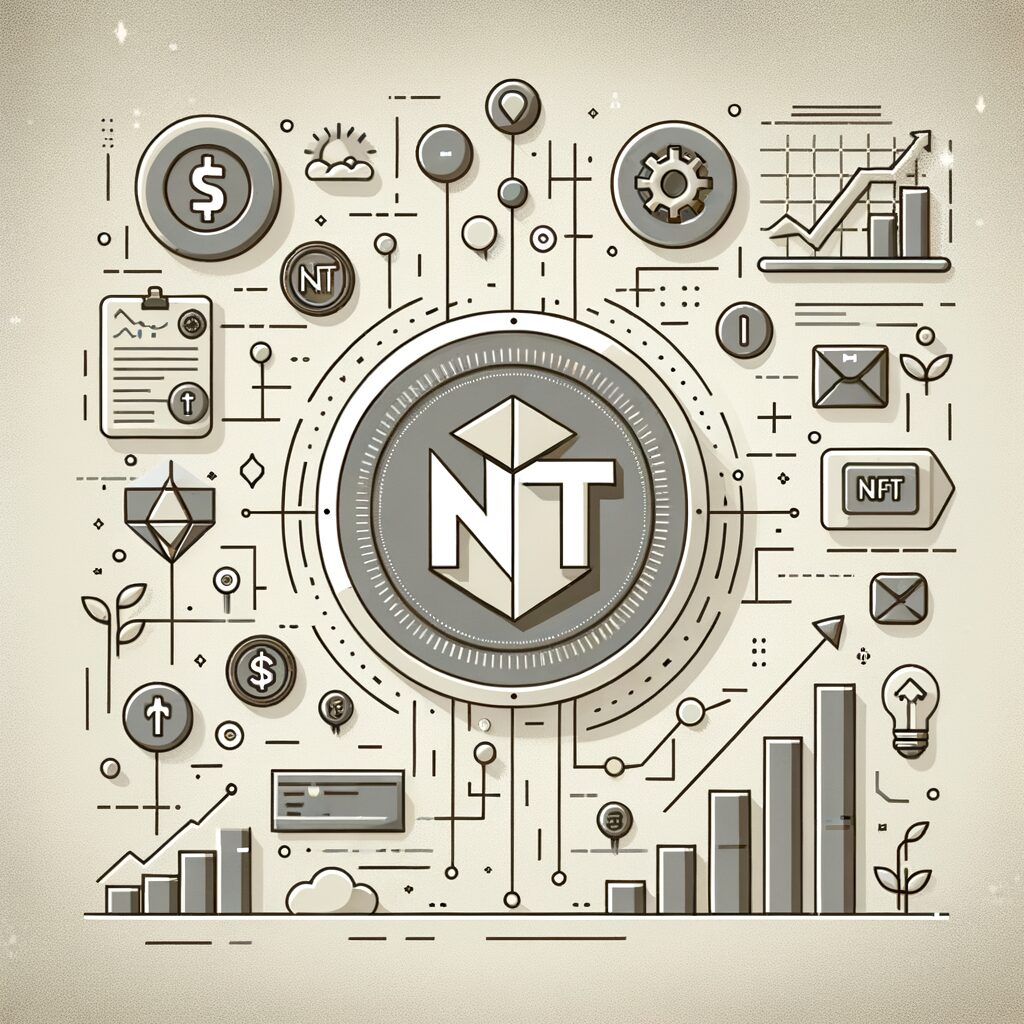
“Navigate the NFT Frontier: Unlock Potential, Embrace Uncertainty.”
Navigating the NFT Market: Strategies for Successful NFT Investments
Investing in NFTs: Opportunities and Risks in the Non-Fungible Token Market
The advent of blockchain technology has given rise to a novel asset class that is captivating investors and collectors alike: non-fungible tokens, or NFTs. These digital assets, which represent ownership of a unique item or piece of content, have exploded in popularity, offering a new frontier for investment opportunities. However, as with any emerging market, the NFT space is fraught with risks that potential investors must navigate with care and strategic insight.
The allure of NFTs lies in their uniqueness and the immutable proof of ownership provided by blockchain technology. Unlike cryptocurrencies such as Bitcoin or Ethereum, which are fungible and can be exchanged on a one-to-one basis, each NFT is distinct, with its value often tied to its rarity and the demand for the underlying asset it represents. This could range from digital art and collectibles to virtual real estate and beyond. The potential for high returns has drawn many to the NFT market, with some tokens selling for millions of dollars.
Nevertheless, the path to successful NFT investment is not without its challenges. The market is still in its infancy and can be highly volatile, with prices driven by speculation and hype rather than intrinsic value. This makes it imperative for investors to conduct thorough research and due diligence before committing funds. Understanding the creator's reputation, the provenance of the NFT, and the dynamics of the platform on which it is sold is crucial to making informed decisions.
Moreover, the liquidity of NFTs can be a double-edged sword. While the unique nature of these tokens can lead to substantial gains when a buyer with specific interest is found, it can also result in difficulty selling the asset if demand wanes. Investors must be prepared for the possibility that they may not be able to liquidate their holdings quickly or at the desired price point.
Another consideration is the legal and regulatory environment surrounding NFTs, which is still evolving. Issues such as copyright infringement, intellectual property rights, and the potential for fraud are areas of concern that can impact the legitimacy and value of an NFT. Investors should stay abreast of legal developments and seek professional advice when necessary to mitigate these risks.
Despite these challenges, there are strategies that can help investors successfully navigate the NFT market. Diversification is one such approach, spreading investments across different types of NFTs and platforms to reduce exposure to any single asset. Additionally, engaging with the community and participating in forums and social media can provide valuable insights into market trends and sentiment.
Investors should also consider the long-term potential of the NFT and its underlying asset. While short-term flipping can be profitable, those who invest with a long-term perspective may be better positioned to weather market fluctuations and benefit from the growth of the digital economy.
In conclusion, the NFT market presents a dynamic and potentially lucrative investment opportunity for those willing to delve into this new asset class. By understanding the unique characteristics of NFTs, recognizing the inherent risks, and employing a thoughtful investment strategy, individuals can position themselves to capitalize on the opportunities that non-fungible tokens offer. As the market continues to evolve, staying informed and adaptable will be key to success in the fascinating world of NFT investments.
The Future of Digital Collectibles: Analyzing NFT Market Trends

Investing in NFTs: Opportunities and Risks in the Non-Fungible Token Market
The advent of blockchain technology has ushered in a new era of digital collectibles, with non-fungible tokens (NFTs) emerging as a revolutionary asset class. These unique digital tokens represent ownership or proof of authenticity of a wide range of virtual items, from artwork and music to virtual real estate and beyond. As the NFT market continues to evolve, it presents a plethora of opportunities for investors and creators alike, while also posing significant risks that warrant careful consideration.
NFTs have captured the imagination of the public, partly due to their exclusivity and the ability to prove ownership of a digital item unequivocally. Unlike cryptocurrencies such as Bitcoin or Ethereum, which are fungible and can be exchanged on a one-to-one basis, each NFT has a distinct value and cannot be replicated. This uniqueness has led to a surge in demand, with some NFTs selling for millions of dollars, highlighting the potential for substantial financial gains for early investors and creators.
Moreover, the NFT market is not just about high-value art sales. It is also fostering innovation across various sectors. For instance, in the gaming industry, NFTs are transforming the way players interact with in-game assets, allowing them to own and trade virtual goods across different platforms. Similarly, in the world of music, artists are exploring NFTs as a means to monetize their work directly and engage with fans on a deeper level.
However, as with any emerging market, investing in NFTs comes with its own set of challenges and risks. The market is highly speculative and can be subject to extreme volatility. Prices of NFTs can fluctuate wildly based on demand, trends, and the perceived value of the underlying asset, which is often subjective. This makes it difficult to predict long-term value and poses a risk for investors who may not be familiar with the intricacies of the digital art and collectibles space.
Furthermore, the NFT market is still in its infancy and lacks the regulatory framework that traditional financial markets possess. This can lead to issues such as copyright infringement, fraud, and scams, which are prevalent in the absence of clear guidelines and protections for buyers and sellers. Investors must exercise due diligence and approach NFTs with a level of caution, ensuring they understand the provenance and legitimacy of the tokens they are purchasing.
Another consideration is the environmental impact of NFTs. The blockchain networks that support them, particularly those that use proof-of-work consensus mechanisms, require significant amounts of energy to operate. This has raised concerns about the carbon footprint associated with NFT transactions, prompting calls for more sustainable practices within the industry.
Despite these risks, the potential of NFTs cannot be understated. They represent a paradigm shift in the way we think about ownership and value in the digital realm. As the market matures, it is likely that we will see more robust mechanisms for valuation, trading, and regulation, which could mitigate some of the current risks and uncertainties.
In conclusion, the NFT market is a dynamic and rapidly evolving space that offers exciting opportunities for investors and creators. However, it is essential to approach this market with a clear understanding of both its potential and its pitfalls. By staying informed and cautious, participants can navigate the complexities of digital collectibles and potentially reap the rewards of this innovative frontier in the world of investment and art.
Understanding NFT Valuation: What Drives the Price of Non-Fungible Tokens?
Investing in NFTs: Opportunities and Risks in the Non-Fungible Token Market
The advent of blockchain technology has given rise to a novel asset class known as non-fungible tokens (NFTs), which are unique digital assets that represent ownership or proof of authenticity of a wide range of items, from digital art and collectibles to virtual real estate and beyond. As the market for NFTs continues to expand, understanding the factors that drive their valuation is crucial for both seasoned investors and newcomers looking to navigate this emerging space.
At the core of NFT valuation is the concept of non-fungibility, which means that each token is distinct and cannot be exchanged on a one-to-one basis with another token, unlike cryptocurrencies such as Bitcoin or Ethereum. This uniqueness is often derived from the digital asset's rarity, provenance, and the reputation of its creator. For instance, an NFT created by a renowned artist or one that is part of a limited series may command a higher price due to its perceived scarcity and the prestige associated with its origin.
Moreover, the utility of an NFT can significantly influence its value. Some tokens offer additional benefits, such as exclusive access to events, physical items, or in-game advantages, which can enhance their appeal to potential buyers. The broader ecosystem in which the NFT exists also plays a role; for example, virtual land in a popular and well-developed metaverse platform may be more valuable than similar assets in a less established virtual environment.
Another factor to consider is the liquidity of the NFT market. Unlike traditional financial assets, the market for NFTs is still relatively illiquid, meaning that buying and selling can be more challenging, and prices may be more volatile. This illiquidity can lead to significant price swings, as a small number of transactions can have a disproportionate impact on perceived market value.
Furthermore, the sentiment and hype surrounding NFTs can drive prices independently of their intrinsic qualities. Social media buzz, celebrity endorsements, and community engagement can all contribute to heightened demand and inflated valuations. However, this can also lead to speculative bubbles, where prices are driven by investor enthusiasm rather than sustainable factors, posing a risk of sharp corrections when the hype subsides.
Despite the potential for high returns, investing in NFTs carries inherent risks. The market is still in its infancy, with regulatory uncertainty and the possibility of technological issues, such as smart contract vulnerabilities or platform instability. Additionally, the digital nature of NFTs raises concerns about copyright infringement and the authenticity of the underlying assets, which can affect their long-term value.
In conclusion, the valuation of NFTs is a complex interplay of factors including rarity, utility, creator reputation, market liquidity, and social sentiment. Prospective investors must conduct thorough research and exercise caution, as the market is characterized by high volatility and uncertainty. While the opportunities in the NFT space can be significant, they come with risks that should not be underestimated. As the market matures and becomes more integrated with traditional financial systems, a clearer understanding of NFT valuation may emerge, but for now, investors must navigate this new terrain with a blend of enthusiasm and prudence.
Balancing Potential and Peril: Assessing the Risks of Investing in Non-Fungible Tokens
Investing in NFTs: Opportunities and Risks in the Non-Fungible Token Market
The advent of blockchain technology has ushered in a new era of digital ownership and collectibility, epitomized by the rise of non-fungible tokens (NFTs). These unique digital assets have captured the imagination of investors, artists, and collectors alike, offering a novel way to possess and trade digital art, collectibles, and even real estate in virtual worlds. However, as with any emerging market, investing in NFTs presents a complex blend of potential rewards and inherent risks that must be carefully weighed.
At the heart of the NFT phenomenon is the concept of digital scarcity. Unlike traditional digital files that can be copied indefinitely without loss of quality, NFTs are one-of-a-kind assets verified on a blockchain, which provides proof of ownership and authenticity. This scarcity, combined with the cultural and artistic value of the content, can drive up the price of NFTs, sometimes reaching millions of dollars for a single token. The allure of high returns has attracted a diverse group of investors, from seasoned traders to novices drawn by stories of spectacular gains.
Moreover, the NFT market is not just about art. It encompasses a wide array of assets, including in-game items, digital land, and even tokenized versions of physical assets. This diversity offers investors a broad spectrum of opportunities to diversify their portfolios and tap into new and innovative markets. The potential for NFTs to revolutionize industries by enabling new forms of ownership and monetization models is immense, and early adopters may well reap significant benefits.
Nevertheless, the NFT marketplace is fraught with risks that must not be overlooked. The market is still in its infancy and is characterized by high volatility. Prices of NFTs can fluctuate wildly based on market sentiment, trends, and the social media influence of prominent figures. This unpredictability can lead to substantial financial losses for investors who buy at the peak of hype cycles. Additionally, the lack of regulation and oversight in the NFT space raises concerns about fraud and scams, with counterfeit NFTs and dubious projects posing significant threats to unwary investors.
Furthermore, the concept of value in the NFT market is highly subjective and can be influenced by factors that are difficult to quantify, such as artistic merit or the reputation of the creator. Unlike traditional investments, where intrinsic value can be assessed based on earnings or assets, the value of an NFT is often tied to intangible elements. This subjectivity can make it challenging to determine a fair price for an NFT and increases the risk of loss if the market's perception of value changes.
Another consideration is the environmental impact of NFTs. The blockchain networks that support them, particularly those using proof-of-work consensus mechanisms, consume large amounts of energy. This has raised ethical concerns among environmentally conscious investors, who may be reluctant to participate in a market associated with a significant carbon footprint.
In conclusion, investing in NFTs presents a dynamic and potentially lucrative opportunity for those willing to navigate its complexities. The unique nature of these digital assets offers a new frontier for investment and the expression of digital ownership. However, the market's nascent stage, combined with its volatility, subjective valuation, and environmental concerns, underscores the importance of thorough research and a measured approach. Investors must remain vigilant, educate themselves on the intricacies of the NFT space, and be prepared for the possibility of both rapid growth and sudden downturns. By balancing the potential rewards with a clear understanding of the risks, investors can make informed decisions in the evolving landscape of non-fungible tokens.


